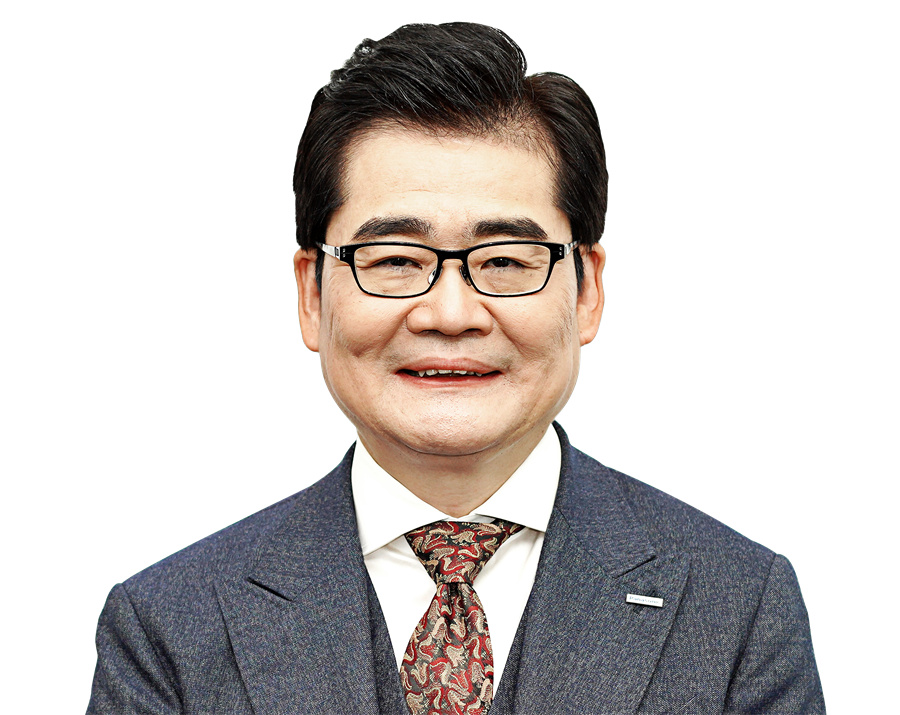Foreign firms enthusiastic about opening-up progress

Editor's Note: These interviews with CEOs of major foreign firms gauge their outlook for the Chinese economy, their operations in China and their business plans for 2024 and beyond, in the wake of the momentous resolution adopted at the third plenary session of the 20th Communist Party of China Central Committee in mid-July.

Q1 The third plenary session of the 20th Communist Party of China Central Committee in mid-July has rolled out the reform and opening-up roadmap for the Chinese economy in the coming years. What are your major takeaways from the plenum? What are the biggest opportunities you spot in China's new measures to deepen reform and further open up its economy? How do you plan to capitalize on these opportunities in your specific industry?
SHIH: We are encouraged by the announcement of various opening-up policy measures, including the deepening of reforms in foreign investment. These initiatives provide a favorable business environment for the long-term growth of foreign enterprises, including Rockwell Automation, in China.
Inspired by the policy measures, such as the removal of all market access restrictions in the manufacturing sector, Rockwell remains dedicated to assisting Chinese partners in enhancing their core competitiveness through our innovative solutions, ultimately aiding in the high-quality development of China's manufacturing sector.
Additionally, measures that encourage collaboration between foreign companies and upstream and downstream enterprises in industrial chains enable Rockwell to extend the advantages of digital transformation to our partners across the value chain. This cooperative approach fosters the development of mutually beneficial relationships that enable the growth and success of both Rockwell and local partners.
ZAMAN: The third plenary session of the 20th Communist Party of China Central Committee reaffirmed the importance of high-quality development for realizing Chinese modernization. In line with China's move toward opening-up, we are observing an evolution of the market access system, which will create opportunities for innovative enterprises and new sectors within the market. Additionally, China is actively encouraging businesses to adopt digital, intelligent and green technologies alongside innovative solutions to transform traditional industries. For Aveva, this presents many opportunities and we are working closely with customers, old and new, to support them in this journey.
HOMMA: The plenum reiterated that the Chinese government aims to "deepen the reform of the management system for foreign and outbound investment, expand the catalog of industries encouraging foreign investment, appropriately reduce the negative list for foreign investment access, and implement comprehensive measures to cancel restrictions on foreign investment in the manufacturing sector". For us, as a foreign enterprise, this is a very important signal of continuity and consistency of policy. Additionally, the resolution adopted at this meeting is crucial for foreign enterprises to understand China's current economic situation and to develop key business directions for the future.
With the new measures to further deepen reform of opening-up, I believe the greatest opportunities lie in promoting high-quality development and improving people's quality of life. Through this meeting, we can feel the positive momentum of China's economy and its resilience and potential for further development.
AYLMER: The highly anticipated third plenum outlined a new blueprint for China's economic and social development for the next five to 10 years. It projected continuity from the reform roadmap and emphasized high-quality development as the top task for China's next phase of modernization.
China's tourism development has stepped into the fast lane, forming the world's largest domestic tourism market and becoming the largest source country and main destination for international tourism. Figures unveiled by the Ministry of Culture and Tourism show that in the first half, both domestic and inbound trips saw stable growth. The macroeconomic data are highly consistent with the fact that our total revenue in the Chinese market continues to grow and indicates a gradual recovery of consumer confidence. We firmly believe that, from a long-term perspective, the Chinese market remains bright and full of opportunities.

Q2 In your view, how will the reform and opening-up measures rolled out at the plenum help strengthen the Chinese economy and bolster its prospects of achieving modernization? Do you think China's new reform and opening-up blueprint will make fresh contributions to the global economy? If yes, how?
SHIH: The plenum stressed efforts to promote wider opening-up with regard to telecommunications, the internet, and medical services sectors, which aligns with Rockwell Automation's continuous strategy of extending local cooperation in these emerging industries.
As a multinational company engaged in industrial automation and digital transformation, we are devoted to supporting our customers and partners through innovative technologies and life-cycle services. This commitment enhances the digital transformation of these sectors and bolsters China's industrial upgrading. In this process, Rockwell's global perspective and extensive resource network play a vital role in assisting Chinese partners in navigating international markets. By collaborating with them, we collectively participate in the development of China's establishment of a dual-circulation development pattern.
Moreover, through these efforts, Rockwell, alongside our local partners, seeks to support the advancement of the Chinese manufacturing sector and contribute to global economic progress through the growth of emerging industries.
ZAMAN: The plenum's reform and opening-up measures outlined several key actions: prioritizing scientific and technological innovation in socioeconomic development, advancing industrial structures toward medium-level and high-end development, expanding international cooperation and openness across all sectors, and enhancing sustainable development capabilities. These initiatives aim to fortify China's economy and establish a robust foundation for modernization.
As the world's second-largest economy, China's reform and opening-up policies will further unleash its development potential, offering increased market, investment and growth opportunities for global enterprises. This, in turn, will drive the global economy forward. At Aveva, we view China as the most promising long-term market, not only due to its scale and innovation, but also because of the country's long-term vision of sustainability, energy and efficiency.
HOMMA: I believe that the significant measures taken by the Chinese government to achieve high-quality development, such as consistently promoting high-level opening-up, improving the business environment, and ensuring equal treatment for both foreign and domestic enterprises in large-scale equipment upgrades and consumer goods trade-in programs, government procurement, and project investments, will help foreign companies seize opportunities, strengthen their presence in the Chinese market, and increase their investments in China.
AYLMER: The third plenum charted the course of the Chinese economy's future development and Chinese-style modernization by laying out over 300 development priorities and plans, including high-level reform and opening-up. The resolution of the plenum prioritizes further opening-up as the major development initiative, with a focus on aligning with the high standards of regional trade agreements. Reform and opening-up remain key drivers of China's economic growth, especially amid the current complex external environment. We believe China will remain a key contributor to global economic growth, and there are tremendous opportunities in the world's second-largest economy.

Q3 How do you view China's new reform initiatives aimed at fostering new quality productive forces, such as those to encourage industrial upgrade and technological innovation? Do you see these as opportunities or challenges for foreign enterprises, and why?
SHIH: China's new reform initiatives aimed at fostering new quality productive forces underscore the significant potential and opportunities in the country's technology and innovation sectors. Rockwell Automation remains committed to advancing technological progress in collaboration with local partners. Through close collaboration, Rockwell actively promotes the large-scale application of emerging technologies such as 5G, artificial intelligence and industrial internet of things in China.
Rockwell is devoted to establishing world-class cross-border platforms in China. A key instance of this dedication is our partnership with Caohejing Hi-tech Park in 2023, resulting in the joint establishment of a co-innovation center. This collaboration seeks to accelerate the industrialization and scaling of innovative technologies, bridging the gap between technology innovation and economic benefits.
ZAMAN: China proposed new quality productive forces in 2023, focusing on high-tech and high efficiency, aligning with the country's emphasis on achieving high-quality development for Chinese modernization.
For China to achieve its high-quality development goals, scientific and technological innovation and industrial transformation are essential. Aveva helps industrial enterprises in China achieve this by connecting people with trusted information and insights, driving greater efficiency in a responsible manner.
Our long-standing expertise in manufacturing transformation and technological innovation positions us uniquely in this field. We leverage cutting-edge technologies like artificial intelligence, big data, industrial internet of things, cloud computing and digital twins to provide the digital backbone business leaders need to build safe, efficient, agile and sustainable operations.
HOMMA: Panasonic has about 50,000 employees in China and nearly 10,000 of them are dedicated to technical research and development. I have always believed that China is not only a manufacturing giant and a major consumer market, but also an innovator with exceptional engineering talent. I am convinced that the cost of doing business in China reflects the global standard. Currently, we develop our products in China, and if we can't succeed here, we won't be able to succeed anywhere in the world.
AYLMER: The core of new quality productive forces is about advanced productivity featuring high-tech, high efficiency and high quality. It is the driving force of reform to advance the high-quality development of China's economy. The resolution of the plenum vows to develop China's innovative capabilities to achieve greater self-reliance and strength. It is more an opportunity than a challenge for MNCs in China.
Though competition between foreign and domestic companies in certain sectors might be fiercer, China's ongoing efforts to foster new quality productive forces will eventually inject fresh momentum into global economic growth and provide massive opportunities for MNCs to explore the huge market here. Foreign investors will also be able to work with China in pushing for further progress in industrial upgrades and sci-tech innovation.

Q4 While China is expanding opening-up, some are concerned that geopolitical tensions, rising protectionism and global supply chain adjustments may weaken China's attractiveness to foreign companies. What's your take? How important will China be for your global business in the coming decade? What more opening-up measures can China take to offset the impact of the complex external environment?
SHIH: Rockwell Automation entered the Chinese (mainland) market in 1988, and we appreciate China's ongoing reform and commitment to high-standard opening-up. This supportive business environment has bolstered our confidence in our development within China, enabling us to better understand and address the unique needs of our local partners.
Driven by this understanding, Rockwell is committed to utilizing our advanced technologies, operational excellence, and cross-border ecosystems to support the high-quality development of China's manufacturing sector. As we move forward, we will continue to foster business exchanges and collaboration with local partners, leveraging our collective strengths to unlock new opportunities in the global marketplace together.
ZAMAN: We remain optimistic about the long-term potential of the Chinese economy. China's economic landscape is dynamic and resilient, characterized by ongoing reforms, technological advancements, and a strong commitment to sustainable development. The country's robust infrastructure, thriving innovation ecosystem and large consumer base continue to underpin its economic vitality.
Despite market challenges, we are confident in China's economic resilience and have demonstrated that through our investments here to improve our operations, enhance our customer relationships, and foster local partnerships.
HOMMA: In a survey on the economic outlook of Japanese companies in China, conducted by the Japanese Chamber of Commerce and Industry in China in May, where I serve as chairman, it was found that 56 percent of these companies plan to maintain or increase their investment in the Chinese market this year. Beyond expanding their manufacturing capabilities, they also aim to invest more in talent development and research and development. Many Japanese companies have found their place in the market and will continue to make significant contributions.
Panasonic's business in China now accounts for about 23 percent of our global business scale. We have 64 corporate entities and around 50,000 employees in China, with nearly 10,000 of them working in R&D. This highlights the crucial importance of our presence in China.
AYLMER: Despite the complex international uncertainties currently, China is inevitably an important part of the global supply chain. Though there are ups and downs, the resilience of China's economy is foreseeable. China will continue to be a great investment destination for foreign companies. MNCs should maintain strategic focus and seize opportunities at present. We remain confident about the Chinese market, and this is unchanged.
IHG is also a beneficiary of China's reform and opening-up. We are optimistic about the Chinese market's growth and have full confidence in its potential. Additionally, we are encouraged by the continued supportive government policies toward travel and tourism, infrastructure investment, and economic development.
Q5 The plenary session has stressed that reform tasks laid out at the meeting shall be completed by the time the People's Republic of China celebrates its 80th anniversary in 2029. How do you expect the new reform and opening-up measures to transform the Chinese economy in the coming five years? What strategies will your company adopt to align with the expected transformation? Looking ahead, in the second half of 2024, what are your expectations for the Chinese economy? How do you think your company will fare in this evolving landscape?
SHIH: China's recent reform and opening-up measures reaffirm its dedication to fostering an open economy and driving modernization, with a significant focus on sustainable development. These initiatives align seamlessly with Rockwell Automation's sustainable values. As a green technology pioneer, Rockwell is eager to support this endeavor by actively partaking in the advancement of China's sustainable manufacturing landscape.
Furthermore, Rockwell prioritizes the cultivation of a robust green development ecosystem in China. In 2024, we jointly initiated the Climate Lighthouse initiative with Shanghai Climate Week, signaling the start of a long-term plan centered on smart and sustainable innovations. Through this continuous endeavor, Rockwell will forge stronger collaborations with Chinese partners to create a synergistic community that promotes a net-zero future.
ZAMAN: We see China as a highly promising and enduring market due to its immense scale, innovation capabilities, and unwavering commitment to achieving net-zero goals. Through our industrial intelligence solutions, we hope to be able to support China's journey toward greater sustainability, energy efficiency and innovation.
As China continues to modernize, we anticipate growing demand for digital transformation across various industries. This evolving landscape presents exciting opportunities for Aveva to collaborate with businesses of all sizes, helping them optimize operations, reduce carbon emissions, and enhance efficiency.
HOMMA: To keep up with the rapidly changing environment, Panasonic is vigorously pursuing localization strategies. Our products and software for the Chinese market are developed locally, as are our IT systems that support daily operations. These systems are created by the Panasonic China team and utilized by our 64 subsidiary companies. We are also building a robust R&D team in China to deliver advanced products to Chinese consumers. Looking ahead, we aim for our Chinese team to support the Belt and Road Initiative and serve customers worldwide.
AYLMER: China's GDP expanded 5 percent in the first half of 2024, and is on track to hit the full-year economic growth target. It mirrors a comprehensive picture of China's economy: while facing both internal and external challenges, it is undergoing a stage of transformation toward a high-quality development model under which the development of new drivers, such as new quality productive forces, is gaining steam.
Our industry is also feeling the change, but the fundamentals remain solid, and the market remains appealing in the long run. Our approach will be dynamic, rooted in deep market insight and aligned with the government's priorities.
